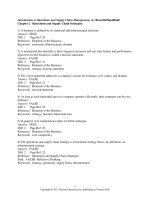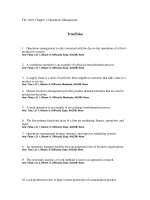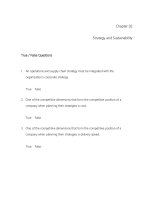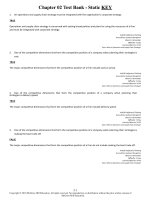Lecture Operations and supply chain management: The Core (3/e) – Chapter 12: Lean supply chains
Bạn đang xem bản rút gọn của tài liệu. Xem và tải ngay bản đầy đủ của tài liệu tại đây (977.81 KB, 15 trang )
Lean Supply Chains
Chapter 12
McGrawHill/Irwin
Copyright © 2013 by The McGrawHill Companies, Inc. All rights reserved.
Learning Objectives
1.
2.
3.
4.
5.
6.
7.
8.
Explain what Lean Production is.
Describe how a pull production system works.
Understand Toyota Production System concepts.
Summarize important attributes of a lean supply
chain.
Analyze a supply chain process using value
chain mapping.
Learn the principles of lean supply chain design.
Learn how a Kanban system works.
Show examples of applying lean thinking to
service companies.
122
Lean Production
123
Lean Logic
124
Toyota Production System
Eliminatio n o f Was te
1.
2.
3.
4.
5.
6.
7.
Waste from
overproduction
Waste of waiting time
Transportation waste
Inventory waste
Processing waste
Waste of motion
Waste from product
defects
Re s pe c t fo r Pe o ple
1.
2.
3.
4.
5.
Lifetime employment
for permanent
positions
Maintain level
payrolls even when
business conditions
deteriorate
Company unions
Bonuses
View workers as
assets
125
Lean Supply Chains
126
Lean Focused Supply Chain
Components
127
Principles of Lean Supply Chain
Design
128
Lean Concepts
Plant layout designed to ensure balanced work
flow with a minimum of WIP inventory
Preventive maintenance is emphasized to avoid
downtime
Operators perform much of the maintenance to keep
equipment reliable
Group technology - a philosophy in which similar
parts are grouped into families
The processes required to make the parts are
arranged in a manufacturing cell
Eliminated movement and queue time between
operations, reduces inventory, and reduces
employees
129
Quality/J ust-in-Time
Quality at the source - do it right the first time and
if something goes wrong, stop the process
immediately
Workers are personally responsible for the quality of
their output
Workers become their own inspectors
Workers are empowered to do their own maintenance
J IT production - producing what is needed when
needed and nothing more
Anything over the minimum is waste
Typically applied to repetitive manufacturing
Idea lot size is one
Vendors ship several times a day
J IT exposes problems otherwise hidden by inventory
1210
Lean Production Schedules
1211
Kanban Systems
Kanban
means
“sign” or
“instruction
card” in
J apanese
Cards or
containers
are used
Make up
the Kanban
pull system
1212
Determining the Number of
Kanbans Needed
Setting up a Kanban
system requires
determining the number
of Kanbans cards (or
containers) needed
Each container
represents the minimum
production lot size
An accurate estimate of
the lead time required to
produce a container is
key to determining how
many Kanbans are
required
k =number of Kanban card
sets
D =average number of units
demanded over a given time
period
L =lead time to replenish an
order (in same time units as
demand)
S =safety stock expressed as
a percentage of demand during
leadtime
C =container size
1213
Lean Supply Chains
1214
Lean Supply Chains
1215









